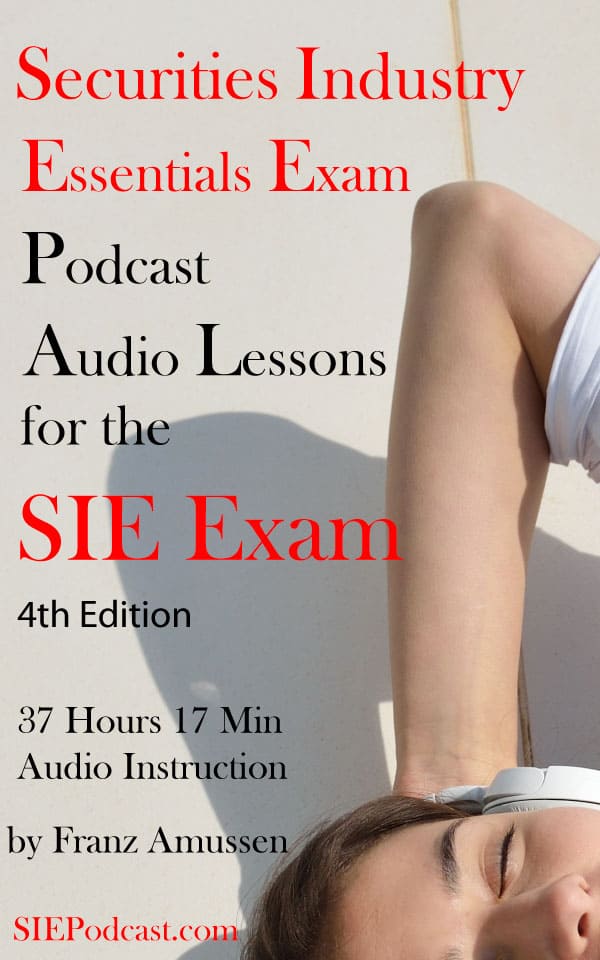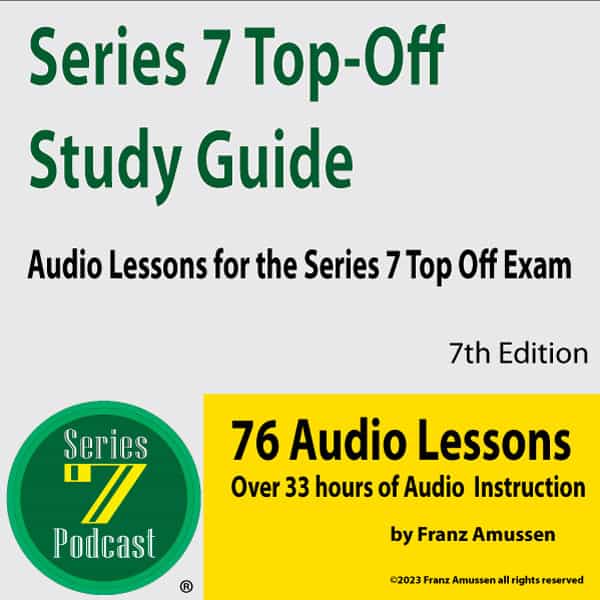2024 Series 7 Top-Off Exam Quiz Lesson 45 Mutual Funds pt 3
Description
Series 7 Top-Off Exam Quiz Lesson 45 Mutual Funds pt 3
This is the Series 7 Top-Off Exam Quiz Lesson 45 Mutual Funds pt 3
Questions covered include
1. Which of the following is true about hedge funds?
(Select all that apply.)
A. They are not allowed to cut off withdrawals by their investors.
B. They are open to any kind of investor.
C. They charge a management fee.
D. They have a cap on the amount that is available to be withdrawn at any given time.
2. What is the minimum capital for a hedge fund?
A. $100,000
B. $200,000
C. $500,000
D. $1,000,000
3. Which of the following is qualified as an accredited investor according to the Securities Act of 1933?
(Select all that apply.)
A. a bank
B. a charitable organization with a total asset of $5 million
C. a trust with a total asset of $10 million
D. an employee benefit plan that has a total asset of $3 million
4. A business is qualified to be an accredited investor if all its equity owners are accredited investors.
A. True
B. False
5. A natural person can be an accredited investor if that person ___.
(Select all that apply.)
A. has an income exceeding $200,000 in each of the two most recent years and a reasonable expectation of the same income level in the current year
B. has individual net worth that exceeds $1 million including the value of the primary residence of such person
C. has a joint income with the spouse exceeding $200,000 in each of the two most recent years and a reasonable expectation of the same income in the current year
D. has a joint net worth with the person’s spouse that exceeds $1 million excluding the value of the primary residence of such person
6. The performance of a hedge fund is always better than the market.
A. True
B. False
7. Which of the following strategies does a hedge fund employ?
(Select all that apply.)
A. global macro hedge fund strategy
B. relative value arbitrage
C. high-frequency trading
D. currency strategies
8. A mutual fund’s annual and semiannual report has an income statement similar to a regular corporate income statement.
A. True
B. False
9. Which of the following can be found in a mutual fund’s income statement?
(Select all that apply.)
A. dividends
B. capital gains
C. expenses
D. net income
10. Which of the following is true about expense ratio?
(Select all that apply.)
A. It applies to closed-end funds but not to open-end funds.
B. It gives an overall look at how much it costs to pay the management to buy the stocks instead of buying it yourself without paying any management fee.
C. It is the total net assets divided by the total expenses.
D. It shows the efficiency of the fund.
11. If you’re buying a fund at a very big discount but has a very high expense ratio, the discount you’re buying those stocks may disappear.
A. True
B. False
12. An investment company should distribute at least ___ of its income in order to be regulated under the Investment Company Act of 1940.
A. 80%
B. 85%
C. 90%
D. 95%
13. If an investment company is not regulated under the Investment Company Act of 1940, ___.
A. it becomes taxed as a regular corporation
B. it has to pay an additional tax equivalent to 2% of the total capital gains
C. it will require double management fees
D. its net pass is not taxed
14. Investment companies can pass through capital gains ___.
A. monthly
B. quarterly
C. semiannually
D. at the end of the year
15. An investor buying a mutual fund at the end of the year will not be paying taxes if he has not made any money in the fund.
A. True
B. False
16. It is a type of mutual fund having a portfolio that is constructed to mimic the market index.
A. closed-end fund
B. exchange traded fund
C. index fund
D. open-end fund
17. These funds are traded as regular stocks on the stock exchange, but move throughout the day.
A. closed-end fund
B. exchange traded fund
C. index fund
D. open-end fund
18. As an investor in a fund or in a management company, you have the right to ___.
(Select all that apply.)
A. receive annual and semiannual reports
B. vote annually on the investment adviser contract
C. vote every year on the board of directors
D. vote on any changes in the investment objectives
19. In an investment company, ___ of the directors must be non-interested.
A. 75%
B. 80%
C. 85%
D. 90%
20. In a dollar cost averaging, when the price of the stock goes up, ___.
A. you’re buying fewer shares on any given month
B. you’re buying more shares on any given month
C. you’re buying the same number of shares on any given month
D. you cannot buy any shares until the price of the stock returns to market price
Series 7 Top-Off Exam Quiz Lesson 44 Mutual Funds pt 2
The Series 7 Top-Off Study Guide Audio Lessons for the New Series 7 Exam is the most comprehensive set of audio lessons which is available for the preparation to take the New Series 7 Top off Examination the course consists of 74 lessons which amounts to 32 hours and 27 min. in total length. Audio lessons are a supplement and not a substitute for the book learning that you should also be doing. Audio lessons simply allow you to learn comprehend and reinforce what you should also be learning through normal studying methods such as attending classes, reading books, and taking practice quizzes.
The full table of contents for the Series 7 Top-Off Study Guide is located here
The New Series 7 Top- Off Study Guide Audio Lessons is 74 lessons and a Total Length 32 hours 27 Min
 The full table of contents for the Securities Industry Essentials Exam Podcast Audio Lessons for the SIE Exam is located here
The full table of contents for the Securities Industry Essentials Exam Podcast Audio Lessons for the SIE Exam is located here
Effective October 1, 2018 Financial Industry Regulatory Authority (FINRA) changed the licensing of those that wish to work in the financial services industry. There is now a required prerequisite for most of the Licensing tests and this is the Securities Industry Essentials Exam
Securities Industry Essentials Exam is a new FINRA exam for prospective securities industry professionals. This introductory-level exam assesses a candidate’s knowledge of basic securities industry information including concepts fundamental to working in the industry, such as types of products and their risks; the structure of the securities industry markets, regulatory agencies and their functions; and prohibited practices.
Unlike the licensing exams such as the Series 4, 6, 7, 9, 10… which require the candidate to be employed by a member firm, Securities Industry Essentials Exam is open to anyone over the age of 18 including students and prospective candidates interested in demonstrating basic industry knowledge to potential employers.
Association with a firm is not required, and individuals are permitted to take the exam before or after associating with a firm.
Essentials exam results are valid for four years.
Check out our podcast for the SIE Exam
Here is a link to our other study products








